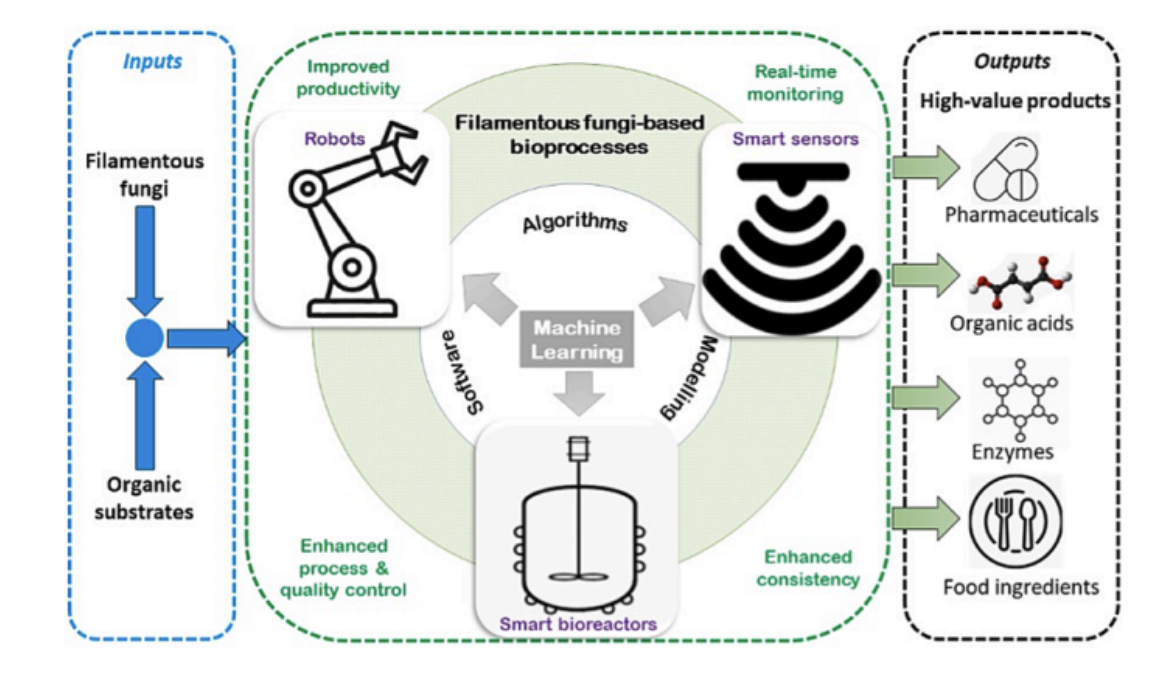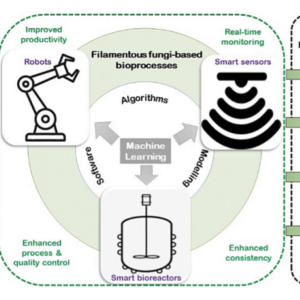

Automation and AI in Fungi-Based Bioprocesses: Advancing Towards Sustainable Biomanufacturing:
Integrating automation and AI in fungi-based bioprocesses marks a significant advancement in biomanufacturing, particularly in achieving sustainability goals through circular economy principles. Filamentous fungi possess remarkable metabolic versatility, making them ideal candidates for converting organic substrates into valuable bioproducts. Automation replaces manual tasks with mechanized tools, optimizing process efficiency and reducing human error. Conversely, AI empowers these systems with predictive analytics and real-time decision-making capabilities based on data insights, enhancing process control and resource utilization. This synergy enables fungi to produce diverse bioproducts such as enzymes, organic acids, and bioactive compounds, contributing to sectors ranging from pharmaceuticals to food technology.
The application of smart bioreactors equipped with sensors and actuators ensures precise monitoring and control of fungal growth dynamics in both submerged fermentation (SmF) and solid-state fermentation (SSF) systems. This technological integration addresses critical challenges like oxygen transfer limitations and heat buildup, which traditionally hindered scalability. By leveraging Industry 4.0 principles, biomanufacturing sectors can achieve autonomous operation, optimizing production yields and minimizing environmental impact. Despite these advancements, further research is needed to fully exploit AI’s potential in optimizing nutrient utilization and product yield in fungi-based bioprocesses, particularly in the context of food production, thus bridging existing knowledge gaps for future sustainable innovations.
Basics of Automation, Artificial Intelligence, and Machine Learning:
Automation in industrial biotechnology involves replacing manual tasks with mechanized tools to enhance process control and optimization, thereby reducing human error and contamination risks. AI simulates human cognitive abilities, enabling machines to make autonomous decisions based on data analysis. It encompasses supervised, unsupervised, semi-supervised, and reinforcement learning methods, crucial for optimizing bioprocesses by improving productivity and ensuring regulatory compliance. Robots, integral to automation, perform repetitive or hazardous tasks with precision and efficiency, contributing to enhanced data acquisition and process reliability.
AI-Based Tools and Systems in Filamentous Fungi Cultivation:
In filamentous fungi cultivation, leveraging AI-driven tools and systems is crucial for optimizing bioprocesses by maximizing product yields and minimizing costs and environmental impacts. Automation through AI facilitates real-time monitoring and control of critical parameters like pH, temperature, and nutrient levels. Smart sensors enable in situ sampling, providing continuous data without disrupting sterility. Image analysis tools automate biomass measurement and fungal morphology assessment, enhancing efficiency and accuracy. Robotic systems handle complex tasks such as nutrient addition and sampling. Smart bioreactors integrate AI for advanced process control, improving scalability and reproducibility. These technologies promise to revolutionize fungal bioprocessing by ensuring consistent, high-quality production outcomes.
Automated Estimation of Water Activity in Solid-State Fermentation:
In SSF, where fungi thrive with minimal free water, accurately estimating water activity (aw) is crucial for optimizing growth conditions. A method was devised using MATLAB to estimate surface condensation, a proxy for aw, based on digital image analysis of fungal biomass and water droplets. This non-destructive approach offers a cost-effective means to monitor and control fermentation parameters, ensuring optimal fungal growth and metabolic activity. Such advancements enhance process efficiency and mitigate contamination risks, underscoring the role of AI-driven tools in advancing SSF bioprocessing.
Research Needs and Future Directions in Fungi-Based Bioprocesses:
Future advancements in fungi-based bioprocesses should focus on integrating AI and automation to enhance real-time data collection, optimize the production of organic acids, enzymes, and pharmaceuticals, and improve operational efficiency. Developing multi-parameter smart sensors to streamline monitoring and control is critical, reducing installation complexity and contamination risks. Additionally, advancements in automated morphology control, online biomass estimation, and quality control are essential for scaling up bioprocesses effectively. Addressing these challenges will support sustainable food production and meet rising global demands amidst climate and resource constraints, driving towards more efficient and cost-effective bioprocessing solutions.
Sources:
The post Advancing Sustainability Through Automation and AI in Fungi-Based Bioprocessing appeared first on MarkTechPost.